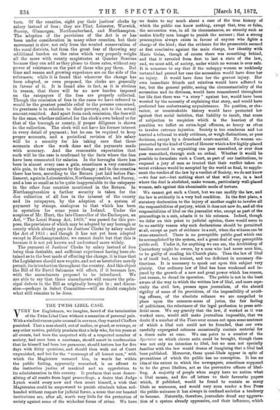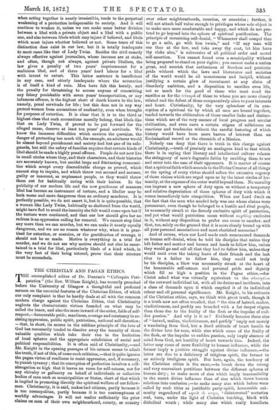THE TWISS LIBEL CASE.
VERY few Englishmen, we imagine, heard of the termination of the Twigs Libel Case without a sensation of personal pain. With& vindictiveness quite unusual in our race, they wanted Chaffers punished. That a man should, out of malice, or greed, or revenge, or any other motive, publicly proclaim that a lady who, for ten years at all events, had been the unspotted wife of a respected member of society, had once been a courtesan, should assert in confirmation that he himself had been her paramour, should torture her for five days with filthy questions, and should then walk out of Court unpunished, and but for the "contempt of all honest men," with which the Magistrate menaced him, in words far within the public feeling, apparently unscathed, is an affront to the instinctive justice of mankind and an opprobrium to its administration in this country. It produces that most demor- alizing of all results from legal proceedings, a desire that Judge Lynch would every now and then assert himself, a wish that Magistrates could be empowered to punish criminals taken red- banded without respect for judicial forms, a sense that our boasted institutions are, after all, worth very little for the protection of society against some of the wickedest forms of crime. We have
no desire to say much about a case of the true history of which the public can know nothing, except that, tree or false, the accusation was, in all its circumstances, an atrocity such as makes kindly men hunger to punish the accuser ; that a strong presumption always exists in favour of anyone who fights a charge of the kind ; that the evidence for the prosecutrix seemed at first conclusive against the main charge, her identity with Marie Gelas, though of course there was something behind, and that it revealed from first to last a state of the law, and, we must add, of society, under which no woman is ever safe. It is nonsense to say that if the unhappy woman so recklessly tortured had proved her case the accusation would have done her no injury. It would have done her the gravest injury. Her own immediate friends and relatives would have adhered to her, but the general public, seeing the circumstantiality of the accusation and its dirtiness, would have remembered throughout her life that there was "a story" against her, would have been worried by the necessity of explaining that story, and would have preferred less embarrassing acquaintances. No position, or cha- racter, or unmistakable history would have protected her against that social isolation, that liability to insult, that sense of subjection to suspicion which is the heaviest of the penalties we inflict on extra-legal offences, so heavy as often to involve extreme injustice. Society is too cumbrous and too hurried a tribunal to study evidence, or weigh distinctions, or pass decisions, except by a drumhead court-martial. No woman un- protected by the kind of Court of Honour which a few highly-placed families succeed in organizing can pass unscathed, or ever does pass unscathed, through such an ordeal. Whether it would be possible to formulate such a Court, as part of our institutions, to empanel a jury of men so trusted that their verdict taken on secret evidence would be accepted by the world as final, to supple- ment the verdict of the law by a verdict of Society, we do not know —we fear not—but nothing short of that will ever, in, a land where the duel is abolished, make women, particularly well-placed women, safe against this abominable mode of torture.
We cannot get such a Court, but we can modify the law, and the law is evidently in a very bad condition. In the first place, a statutory declaration to the injury of another ought to involve all the responsibilities of perjury, which it does not now do, and all the responsibilities of libel on the journalist who, except as part of the proceedings in a snit, admits it to his columns. Indeed, though we defer on this point to judicial opinion, there would seem to be no earthly reason why such declarations should be permitted at all, except as part of evidence in a suit, when the witness can be cross-examined. There is no perceptible public good which can be accomplished by the system, and a great deal of very perceptible public evil. Under it, for anything we can see, the Archbishop of Canterbury might be sworn, by a man who had never seen him, to be guilty of stealing his Church plate. Then the law of libel is of itself bad, too lenient, and too deficient in necessary dis- tinctions. It is necessary to speak out upon this subject very plainly. Our ordinary law of libel has been weakened and in- jured by the growth of a new and great power which has reason, just reason, to dread its operation. The public is not in the least aware of the way in which the written law of libel, and more espe- cially the civil law, presses upon journalists, of the absurd rigidity of some of its provisions, of the impossibility of avoid- ing offence, of the absolute reliance we are compelled to place upon the common-sense of juries, the fair feeling of politicians, the reluctance of the legal profession to press arti- ficial cases. We say gravely that the law, if worked as it was worked once, would still make journalism impossible, that we doubt if a number of the Times ever comes out upon some sentence of which a libel suit could not be founded, that our own carefully expurgated columns occasionally contain material for a dozen suits at once. We can point to a number of the Spectator on which eleven suits could be brought, though there was not only no intention to libel, but no man not specially familiar with the law would dream of imagining that a libel had been published. Moreover, these quasi-libels appear in spite of precautions of which the public has no conception. It has no idea of the extent to which the newspapers, sometimes supposed to be the great libellers, act as the preventive officers of libel- ling. A majority of people when angry have no notion what a libel means, and fire off letters to their favourite papers
which, if published, would be found to contain as many libels as sentences, and would very soon render a free Press the public nuisance it has always in confined societies a tendency to become. Naturally, therefore, journalists dread any aggrava- tion of a system already oppressive, and their influence, which when acting together is nearly irresistible, tends to the perpetual weakening of a protection indispensable to society. And it will continue to weaken it, unless we can make some better division between a libel with a private object and a libel with a public one, and also between libels which may injure if believed, and libels which must injure whether believed or not. Some trace of this distinction does exist in our law, but it is totally inadequate to meet cases like that of Lady Twiss. Besides the civil remedy always effective against journalists, whose incomes are at stake, and often, though not always, against private libellers, the law gives a penalty of two years' imprisonment for a malicious libel, and of three years' hard labour for a libel with intent to extort. This latter sentence is insufficient in any case, and utterly inadequate where the accusation is of itself a kind of ruin. Men have felt this keenly, and the penalty for threatening to accuse anyone of committing any felony punishable with seven years' transportation, or any infamous offence, is the highest short of death known to the law, namely, penal servitude for life ; but this does not in any way protect women from accusations of unchastity, even when brought for purposes of extortion. It is clear that it is to the third or highest class that such accusations morally belong, that libels like that on Lady Twiss, if proved to be put forward for the alleged cause, deserve at least ten years' penal servitude. We know the immense difficulties which environ the question, the danger of protecting too much till, for example, an adulterer would be almost beyond punishment and society. had lost one of its safe- guards, but still the safety of families requires that certain kinds of libel should be made a highly penal offence. People do not now live in small circles where they, and their characters, and their histories are accurately known, but amidst large and fldctuating Communi- ties which accept every discreditable charge as proved, which cannot stop to inquire, and which throw out accused and accuser, guilty or innocent, as unpleasant people, as they would throw them out for habitually eating with their knives. In the publicity of our modern life and the new gentleness of manners libel has become an instrument of torture, and a libeller may be both worse and more dangerous than an ordinary murderer. It is perfectly possible, we do not assert it, but it is quite possible, that a woman like Lady Twiss, habitually so sheltered from the world, might have fled to avoid the insanity she felt would come upon her if the torture were continued, and that our law should give her no redress is an oppression calling for removal. We cannot stop libel any more than we can murder, but we can make it nearly equally dangerous, and we see no reason whatever why, when it is prac- tised for extortion, or coercion, or the gratification of revenge, it should not be so made. Motive is everything in a trial for murder, and we do not see why motive should not also be ascer- tained in a trial for libel, particularly libels of a kind which, in the very fact of their being uttered, prove that their utterers must be scouudrels.



































 Previous page
Previous page